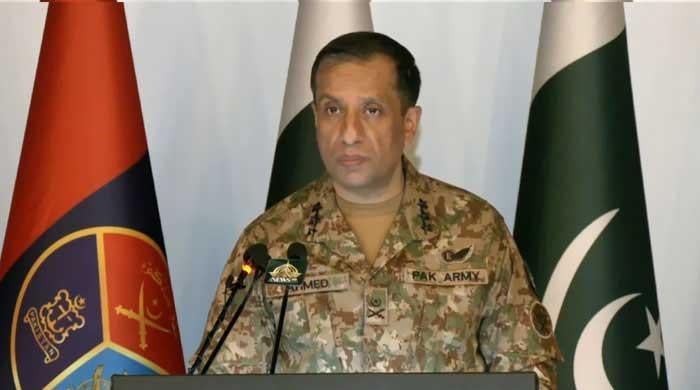DG ISPR: Nuclear War with India ‘Unimaginable’
Director General of Inter-Services Public Relations (ISPR), Lieutenant General Ahmed Sharif Chaudhry, stated that a nuclear exchange between Pakistan and India would be an act of utter folly, deeming such a prospect unthinkable and illogical.
The military’s spokesperson shared these thoughts in a conversation with a British media outlet following recent tensions with India.
He cautioned that a nuclear confrontation could result in the complete devastation of both nations.
“Pakistan is committed to peace; however, we stand fully prepared if war is forced upon us,” the spokesperson affirmed.
He criticized India’s “arrogant” propagation of a war-like narrative between the two countries, emphasizing the existence of a dispute that could escalate rapidly.
Responding to a question concerning the potential for nuclear conflict between the South Asian countries, the DG ISPR suggested that India is “playing a dangerous game” founded on misinformation.
Chaudhry further commented that Pakistan has acted responsibly, thereby preventing an escalation of the situation. Addressing Indian accusations regarding Pakistan’s involvement in the Pahalgam incident, he committed to taking action if India provides evidence against a Pakistani individual.
He noted that within India, there seemed to be a lack of rigorous inquiry into the security shortcomings that precipitated the event, as well as a lack of interest in understanding the underlying causes.
Regarding the ceasefire, the military spokesperson conveyed Pakistan’s dedication to peace, stating that the nation is celebrating peace, not a triumph.
In response to another question about covert communications between the two nations, the DG ISPR deferred to the foreign ministry, stating that the military is not involved in political or diplomatic matters.
Chaudhry recounted Pakistan’s robust response to Indian aggression on the night of May 6-7, adding, “We downed six Indian aircraft, and we had the capacity to destroy more.”
Pakistan’s armed forces initiated a comprehensive retaliatory military operation, dubbed “Operation Bunyan-um-Marsoos”, targeting numerous Indian military installations across various regions in response to the unprovoked strikes.
These strikes, characterized by officials as “precise and proportionate,” were a reaction to India’s persistent aggression along the Line of Control (LoC) and within Pakistani territory, which New Delhi asserted were aimed at “terrorist strongholds”.
Pakistan shot down six enemy fighter aircraft, including three Rafales, alongside numerous drones. The conflict concluded around 87 hours later, on May 10, with a ceasefire agreement facilitated by the United States.
The military clash between the two nations was sparked by the previous month’s attack in Indian Illegally Occupied Jammu and Kashmir (IIOJK), which resulted in the death of 26 tourists. India attributed the attack to Pakistan, despite a lack of substantiating proof.



Comments (0)
No comments yet. Be the first to comment!
Leave a Comment